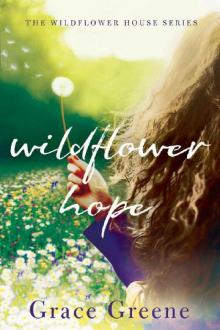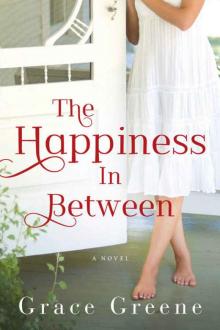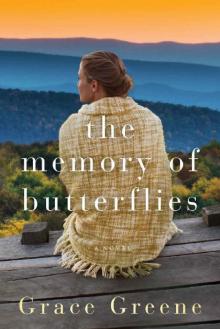- Home
- Grace Greene
The Memory of Butterflies: A Novel Page 5
The Memory of Butterflies: A Novel Read online
Page 5
“You sit on the porch, Gran. You can hold Grand’s old rifle,” I joked. I knew she would never do any such thing. The very image of Gran with a gun or bat across her knees was hilarious. Almost.
“Oh, you can laugh, missy, but I’ll be sitting on the porch, make no mistake about it.” She walked off, muttering, “It won’t be the same, though . . . an old, worn-out grandmother.”
I hadn’t dated in high school. My life had never been centered in town but in the Hollow. I’d engaged in a few school activities and made some friends, but most of those kids were like me, awkward and solitary. None were the partying kind, and I wasn’t around them enough to feel like I was part of a close group of friends. As the week wore on to Friday, I got nervous. I almost called off our date, but then decided that since it was a party, it would be appropriate to drive myself. I could leave whenever I wanted, which reassured me.
At supper, after I set Gran’s plate on the table, I told her what I was intending.
“I’ve decided to drive myself to the party. Instead of anyone coming to pick me up, I’d rather drive. That way if I’m not having a good time, I can leave without asking someone to take me home.”
“That so?” She sipped her coffee before she began cutting up the pork chop. “If you’re not sure about it, maybe you shouldn’t go.” She shook her head. “It’s not as if I don’t think you should socialize. You should do more with friends your age. But I’m picking up vibes from you, Hannah, and it’s making me nervous.”
I set my plate opposite hers and took my seat.
“You’re picking up on my nervousness, Gran. I’ve been too content to stay here at home. Mind you, I love being here, but maybe I’ve . . . Maybe I should do more about getting out and living life.”
“Don’t mistake me, Hannah. I know you love me and love home, and heaven knows you’ve been bound here far more than you should’ve been. It wasn’t your fault you had to be raised by your grandparents, and old grandparents to boot. You’re a young person and should be having fun. But are you driving yourself to this date because you don’t want your friend to see where you live?”
I was stunned. I hadn’t thought of it like that. Perhaps there was truth in it. Our home was small and shabby, but we owned many acres of forest. When the laurel and azaleas were in bloom, and then the honeysuckle vines and trumpet flowers, there was no sweeter, more beautiful place on earth.
“No, Gran.” I shook my head. “I know who I am. I’m Hannah Cooper, and I’m proud of my home and my people.”
“You had to grow up too fast, honey, and without the fun,” Gran said. “If your mama had—” She broke off, and her eyes turned red, as they always did when she mentioned my long-deceased mother.
My parents had died in a car accident when I was a baby. When I grew older and started asking questions, my grandparents told me about it. It was real and it was tragic, but it didn’t feel like a fact of my life because I was so young when it happened. I had no recollection of them and would never know what I’d missed. The loss had been different for my grandparents. It had punched a huge, unfixable hole in their lives.
I thought of what Spencer had said about my being an orphan. Maybe my Grands had viewed my childhood through a similar lens—that of loss. But for me, when I considered my life, I thought of my freedom in the woods, my love of home, my pottery, and my grandfather who drove me into town for school day in, day out whether I wanted to go or not, because he cared about the person I would be.
“I had plenty of fun. No regrets, Gran. I promise.”
One of Spencer’s friends had an uncle who farmed acreage out past Route 33 near the South Anna River. There was a turnoff that went through the trees and ended at a picnic table and a fire pit. It wasn’t dark yet, and it certainly wasn’t cold, but the guys already had a fire going. There were about eight coolers lined up in the bed of a truck, and a couple of guys were unloading them. Spencer saw me watching, and he laughed.
“These parties have a way of growing and getting very thirsty,” he said.
He’d moved closer, and I stepped a few inches away. I was glad I’d driven myself. Whatever I’d expected, this wasn’t it.
As the crowd grew, along with the noise and music, I recognized a few faces. A girl from my senior English class came over, and some others joined us, and soon I found myself laughing with a group of people I hardly knew. Some were total strangers. The last I’d seen of Spencer, he was with some of the guys cooking on a huge grill someone had towed in and was going hard at the beer.
As darkness fell, the clear skies reflected in the river. I maneuvered away from the crowd. My ears were ringing, and my head ached a little. As I stood at the riverbank under the arching branches of a large oak, I was buffered from the worst of the noise, the blasting music, and the smells of alcohol and smoke.
I watched the river flow by in the night. The river water, even in daylight, was dark like Cub Creek, but otherwise, it was very different. The South Anna River wasn’t as wide or graceful as the James River but much wider and more forceful than Cub Creek. Yet the difference was more than that. I tried to imagine this river flowing through the Hollow and decided I wouldn’t want it. It was powerful and beautiful, but it was too accessible. It wasn’t private. It would be too hard to shut out the world.
“Join us,” Spencer said. He handed me a bottle.
“Where’d you go? I haven’t seen you in a while.”
“I had to help get things set up. It’s my fault, though. I should have smarter friends.” He laughed. “That’s a joke, you know.”
I held the bottle but did no more than that. Spencer touched my arm and got bolder and put his arm around my back.
“I’m sorry, Hannah. I should’ve told them to fix things themselves.” He touched my hair. “Listen, if this isn’t what you want . . . If you want to leave, just say the word. I’m with you either way, stay or go.”
I believed him. “No, this is OK. It’s . . . loud.”
He laughed again. “Yes, it is. Look, if you’re willing to stay, then I’m glad because I’m kind of one of the hosts, and it would be rude to leave, but I will, I mean it.” He tapped the bottle. “Take a drink and come over by the fire. Relax and have fun.”
I took a sip and grimaced. Spencer laughed again and pulled me closer. I leaned against him, and we turned away from the river and joined the group.
In the end, the party was a blast. Gran was awake in bed when I came in. She did some pronounced sniffing when I came near, and she might have picked up on the beer because displeasure showed in her face, but she only said, “Did you have a good time?”
“I did.” As I told her good night and bent to kiss her cheek, I was grateful that the heavier smoke from the fire pit probably disguised the worst of the alcohol smell, or else I would likely have gotten a lecture.
“They treated you right, Hannah? The boy and his friends?”
“Yes, ma’am, they did.” In fact, I hadn’t felt the class division I’d experienced in high school, and here we were, barely out of school. Had we grown beyond the artificial social boundaries of that brick building so quickly, or had I imagined they existed? More likely, my welcome was no more than a temporary acceptance because the guy I was there with was one of them.
As I drifted off to sleep that night, I wondered if Spencer would call again. I thought of his laughter and his breath on my cheek when he lowered his voice and spoke only to me. I remembered his arm around me as the evening had worn on. And I thought he probably would.
Spencer and I went out a few times after. I thought I was in love—a sudden love that was all the more amazing because I’d never imagined it was lurking anywhere around us when we passed in the school hallway. Because I was in love, I made some poor decisions. We’d graduated. We were adults now. The kissing and hugging combined with the alcohol, and I said yes. But in the end, it was a crush. Just a crush. I knew it for sure when he didn’t call me afterward, and then I was truly crushed. When I calle
d him, he didn’t answer or return my call. Finally, one day, he did. I happened to answer the phone. When I heard his voice, my heart nearly flew out of my chest and heat rushed up my body to burn my face.
I blurted out, “Why haven’t you called?”
“I’m sorry, Hannah. Really. Things have changed, you know?”
“What things?”
“Well, college is coming up, and I’ve got stuff to take care of and all that.”
I didn’t answer.
He added, “I don’t have time for you right now.”
The words felt like a knife twisting in my gut. “Time for me?”
“Not right now.” He sounded awkward. “I don’t mean not for you, but for hanging out with anyone. Not even with my friends.”
I shook my head. He couldn’t see my head shake, but honestly I was speechless. Gran was nearby. The house was small. She might try not to listen, but how could she not hear?
“Hannah.” His tone changed, softened. “I’m heading off for college in a couple of months. My dad and mom want me to do some things with them, a trip, and my dad wants me to spend time at work with him.”
Which didn’t preclude spending time with the person you loved, right? Unless you’d realized you didn’t love the person after all, at least not as much as the fun stuff you might miss out on by choosing the tougher path of integrity and loyalty.
“I see. I have plans, too. You should’ve been more considerate, had some guts, and not made me chase you down. Have a good life.”
I hung up. I’d tried to keep my voice low, but what were the odds Gran hadn’t heard? I couldn’t face her. I walked out the kitchen door and crossed the yard to the pottery cabin. I sat on the seat at the wheel. All around me, in the corners and above my head in the loft, were things Grand, or others, had stored here over the decades. Sometimes it was like being buried amid someone else’s junk. Other times it was like hugs and memories wrapping around me, a certainty that life had gone on for centuries in our Hollow, not only for the Cooper family but for the Native Americans here before us and for whoever might have preceded them. Life goes on—I’d heard it said many times.
I wanted to be devastated over what amounted to the boy’s abandonment of me. His perfidy. My Grand had been a lover of impressive words, and he’d taught me a bunch of his favorites. Perfidy was a fine one that sounded exactly like its meaning. Treachery. Disloyalty. And I was hurt and angered by the boy’s cowardly actions, but the truth was, I wasn’t really all that hurt. My pride, yes. My feelings, certainly. I’d made some bad choices and tried to fit myself into this person’s life, a life in which I didn’t belong. I lived in Cooper’s Hollow. This was where I belonged. One day, I’d go off to college and be smart and successful, and when I came back to Louisa County and our cozy Hollow, everyone would see how brilliant, beautiful, and fabulous I was.
“Hannah?”
Distantly, I heard Gran’s voice. I’d left the cabin door cracked open for light and air. I got up to look out. She’d pulled a kitchen chair over to the back door and had wedged her cane into the door hinge to prop it open. She was wearing the knee-length housecoat she called a duster. Her legs were encased in the tight white stockings Mildred made her wear for swelling. On her feet were the same worn-out house slippers she’d scuffed around in for years, and she rested the soles on the threshold. She saw me at the cabin door and yelled, “Are you all right, honey?”
Despite a tear or two trickling down my cheek, I laughed. It was a short, embarrassed laugh but already a strong sign of recovery.
“I’m fine.” I wiped at my cheeks and joined her on the porch.
“Never you mind that boy. You should go on to college. Don’t worry about me.”
“I already deferred the grants and the scholarships for this year, so I can’t. Besides, money wasn’t the reason I decided not to go.”
“Hush, child. I’ll do well enough on my own. Our groceries are delivered, as is the propane. Anything I want”—she snapped her fingers—“I can have it delivered out here anytime. In fact, having to do more for myself will be good for me. I’ll get more exercise and grow stronger. Never mind those scholarships. Go talk to Mr. Browne in town. He can work it out.”
“Mr. Browne? The mysterious man in town who sends us money and pays the bills?” Regretting my snarky tone, I added, “Sorry, Gran.”
“He isn’t mysterious at all. He worked for Grand and me, and now he works for me and you. He can advise you. He’ll tell you how much we can afford.”
“Are you talking about going into Grand’s savings? College is very expensive.”
“We can sell off land or the timber. Though,” she muttered, “I don’t hold with selling off the timber.” She added, “But land. We have a lot of that, and we can part with a few acres for your future. I should’ve insisted before. In fact, I’m going to give Mr. Browne a call. Let him know what we’re thinking, and then you go talk to him.”
“No.”
“I mean it, Hannah. I know your grandfather handled all this sort of stuff, and I’ve never stepped up and taken on the responsibility, but I’m serious this time.”
“So am I. It’s too late. I’d have to reapply by certain dates and get accepted and all that. Plus, I don’t want to leave you here alone.”
“Never mind me. Selfishly, I wanted you here with me, so I let it be when you said you were putting off school for a year. But you need this. I see it now. If it’s too late for this coming school year, then we need to get cracking for next year. Or what about midyear? Can’t you start between semesters? You’ve got time to work it out, and we’ll talk to Mr. Browne and find out how best to proceed.”
We were connected to the world by our landline. Here, in our beautiful, homey Hollow, we had no cell reception. That yellow phone on the wall was our link to the outside world, and it brought in both good and bad news. A few days after Spencer’s phone call, Gran said she spoke to Mr. Browne, but she must’ve done it while I was out in the pottery cabin or working outside otherwise. With Gran tied to the house, as she was by her physical limitations, there was never an opportunity for me to communicate privately via phone, unless I left home and drove somewhere.
In the end, I didn’t go to see Mr. Browne. Very soon, other things came up to interfere with the plans we thought we needed to make. I was reminded of something Grand had often said. He’d quoted Proverbs with all the fancy wording of the King James Version, but he’d said the message came down to one certainty: “Man plans; God disposes.”
When I suspected I was pregnant, I didn’t tell Gran. I could be wrong, and there was no sense in getting us worked up over something that might not be true. And there was no point in taking those tests from the drugstore. Either I was or I wasn’t. It wasn’t as if I needed to know by a certain day. I preferred not to think about it. Instead, I spent longer hours out at the potter’s wheel. It was the only place I could hide from Gran without raising questions. She might be old, and her body was worn out, but her senses were sharp.
One morning in September she made me face the truth. I was fixing breakfast, and she was sitting at the kitchen table waiting for her coffee to cool. The bile was rising, and I tried hard to think the nausea away, but my stomach was determined to betray me. As I scraped scrambled eggs onto her plate next to the toast but not touching it—just the way she liked it—Gran confronted me.
“You’re paper white. You think I’m old and don’t know, but I do. Tell me the truth. Is it the boy you were dating? What’s his name? You only ever called him by his first name. Who are his people?”
I wanted to pretend I didn’t know what she was talking about, but any moment now I was going to lose what little I’d eaten that morning. I pressed my hand to my midsection and tried to breathe evenly.
“You don’t need to know his name. He’s gone. Out of the picture. This is on me.” My stomach lurched.
“Gone? What does gone mean?” Her voice rose on each word.
My coffee and
toast were abandoned as I flew to the sink and hovered there. So far, so good. Nothing had come up, but it was a near thing. I clutched the counter and answered her.
“He’s not in the picture, that’s all.”
“What about college, Hannah? And a baby . . . a baby is a gift from God, but babies should have daddies in their lives.”
“I didn’t. Not a mother or a father. I had you and Grand. You were more than enough.”
Gran shook her head, her face full of worry and misery. She rubbed her cheeks, then said, “It wasn’t a choice. Nobody wanted it that way.”
A tear wet her cheek. Tears always happened when I mentioned my dead parents. She couldn’t bear to speak of them. Next, her body would start shaking, and she’d cry in earnest. I went to her and wrapped my arms around her.
I whispered, “He’s a boy, Gran. Not a man. The last thing we need is a grown child to take care of. We’re better off without a boy who doesn’t want to be here and doesn’t want to be an adult.”
Her body shuddered in my arms, and she gripped them with more strength than I could’ve imagined was left in her scrawny hands. “We don’t have Grand anymore. Just you and me. Two women. One too old and one too young. How on earth . . . what in heaven’s name are we supposed to do?”
“Hush, Gran. You’re right. A baby’s a gift. This baby is a gift from heaven, sent to comfort us for all we’ve lost.”
She patted my back. “You have to do the right thing, the honest thing. Hard as it may be, Hannah, that boy, whoever he is, has a right to know. It’s right for his family to know. A baby should be celebrated and loved, not hidden.” She paused and pulled back, her eyes open wide. “Unless he’s a criminal or sick in his head or . . .” She covered her face with her hands, and her shoulders quaked.
A criminal? For heaven’s sake. Where had that come from? I kissed her forehead. “No, Gran, he’s a foolish boy fresh out of high school with no good sense and no proper home training.”

 Wildflower Hope (The Wildflower House)
Wildflower Hope (The Wildflower House) The Happiness in Between
The Happiness in Between The Memory of Butterflies: A Novel
The Memory of Butterflies: A Novel Clair (Beach Brides Book 4)
Clair (Beach Brides Book 4)